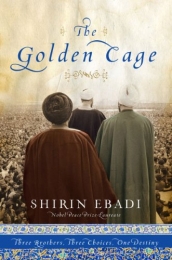Shirin Ebadi is an internationally recognised human rights activist and a lawyer from Iran. In 2003 she won the Nobel Peace Prize for her efforts, especially in promoting the rights of women, children and political prisoners in Iran. It is believed that it was her call for democracy in her homeland that made her an enemy of the current Iranian regime; she has lived in exile in London since 2009.
 The telling of any aspect of a nation’s history, especially where there is conflict, is no easy feat. It’s not always a straightforward venture, as there are two sides to every story. But with The Golden Cage, Ebadi attempts to steer us through the twists and turns of the Islamic Revolution in 1979.
The telling of any aspect of a nation’s history, especially where there is conflict, is no easy feat. It’s not always a straightforward venture, as there are two sides to every story. But with The Golden Cage, Ebadi attempts to steer us through the twists and turns of the Islamic Revolution in 1979.
Ebadi does not tell this story as it would be laid out in a history textbook; rather, she places it in the context of a family life, in this case the family of Simin, her mother’s best friend.
Simin and her husband Hoseini had three sons, Abbas, Touran and Ali, and a daughter Pari, who is the author’s own best friend. As they grow up, each brother subscribes to a different political ideology, and over time they become enemies. In their unbending allegiance to these beliefs, the family’s life – and ultimately that of Iran – is torn to shreds. And one by one each suffer and die for their choices while still trapped in their golden cages of ideology.
Ebadi’s choice of narrative brings to the fore the devastation and suffering that ordinary people all over the world endure in the face of conflict. Witnessing the news of recent times, I can see Simin and Hoseini’s family in every person fleeing violence and persecution – and in those determined to fight against it.
The Golden Cage’s well-rounded account of the Islamic Revolution is powerfully presented alongside issues revolving around Iran’s reasoning for the acquisition of nuclear energy; why their current leadership does not believe that the Israelis should be allowed to live; and why Iran believes that they are the power to be feared in the Middle East and the Muslim world.
The one question I asked myself after reading the book is: what do people want from others, the leaders from the led and vice versa? I don’t know if anybody can truly answer that question, as we all seem to blunder along as far as I can tell.











